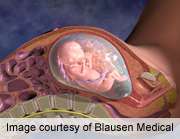Prepregancy folate intake, particularly from supplements, is associated with a reduced risk of spontaneous abortion, according to a study published online June 4 in Obstetrics & Gynecology.
(HealthDay)—Prepregancy folate intake, particularly from supplements, is associated with a reduced risk of spontaneous abortion, according to a study published online June 4 in Obstetrics & Gynecology.
Audrey J. Gaskins, Sc.D., from the Harvard School of Public Health in Boston, and colleagues examined the prospective correlation between prepregnancy folate intake and risk the spontaneous abortion and stillbirth. Data were included for 11,072 women from the Nurses' Health Study II who self-reported 15,950 pregnancies between 1992 and 2009. A food frequency questionnaire was used to assess dietary folate and supplement use every four years.
The researchers found that 17.3 percent of pregnancies ended in spontaneous abortion and 0.8 percent ended in stillbirth. Women in the highest quintile of prepregnancy folate intake (>851 microgram/day) versus the lowest quintile (<285 micrograms/day) had a reduced relative risk of spontaneous abortion (relative risk, 0.91; 95 percent confidence interval, 0.82 to 1.02) in multivariate analysis (P trend = 0.04). This correlation was mainly due to supplemental folate intake. Women in the highest category of supplemental folate intake (>730 micrograms/day) versus no intake had a reduced relative risk of spontaneous abortion (0.80; 95 percent confidence interval, 0.71 to 0.90) after multivariable adjustment (P trend < 0.001). The correlation was consistent across gestational period of loss. A similar inverse trend was seen for stillbirth risk, although this did not reach statistical significance (P trend = 0.06).
"Women at risk of pregnancy should use supplemental folate for neural tube defect prevention and because it may decrease the risk of spontaneous abortion," the authors write.
More information:
Abstract
Full Text (subscription or payment may be required)
Journal information: Obstetrics & Gynecology
Copyright © 2014 HealthDay. All rights reserved.






















